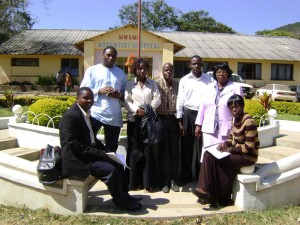Offering better nutrition support to keep HIV-exposed children healthy in Zambia’s Eastern Province was a problem that Sydney Kambobe, a provincial nutrition specialist, grappled with for several years. In Zambia, poor feeding practices, such as giving babies liquids and foods along with breast milk before 6 months of age, put children of HIV-positive mothers at high risk of HIV transmission. Sydney knew that if moms in this province practiced safer feeding, they could reduce malnutrition and improve HIV-free survival for their babies.
Sydney and his provincial health team identified a solution that could prevent illness and save lives: training health workers to support mothers on safer infant feeding practices at health care centers. Yet despite prioritizing the intervention in the province’s action plan, the objective went unmet year after year—mostly because of a lack of local trainers with expertise in infant and young child feeding. Sydney had been waiting for the Ministry of Health’s national trainers to make their way to the province, but they were always occupied working in other parts of the country.

Eastern Province Trainers, including Sydney (back, left), on a supervisory visit to Mwami Hospital in Eastern Province.
Finally, Sydney found an opportunity to move forward with his plan to offer HIV-positive moms the nutrition support they needed. In January 2009, with the help of the US Agency for International Development’s Infant & Young Child Nutrition (IYCN) Project, the Ministry of Health built a provincial team of ten trainers to lead nutrition training activities and follow up with health workers to ensure they are using their new skills. IYCN is providing assistance to update the curricula and materials for six-day trainers’ workshops, coordinating with provincial staff to supervise participants after training, and conducting exit interviews to learn about mothers’ views on the quality of infant feeding counseling provided by trainees.
Since the first training in February 2009, Eastern Province trainers have reached more than 135 nurses and other health care workers to improve critical counseling skills and nutrition expertise. Sydney is pleased with the result; now the province can proceed independently and quickly to meet the need for nutrition training for health providers.
Sydney, who is one of the province’s trainers, has seen dramatic changes in health worker practices first hand. Since a training workshop he conducted at one health facility, workers there have corrected harmful advice for mothers. Before the training, they commonly encouraged mothers to give infants water with sugar shortly after birth, causing a delay in initiation of breastfeeding and making them more vulnerable to infection, including HIV. Now, says Sydney, they offer accurate information, encouraging mothers to initiate exclusive breastfeeding immediately after birth.
According to Joseph Mudenda of the Ministry of Health’s Nutrition Division, creating provincial training teams is a sustainable approach that gives the provinces increased autonomy to carry out activities on their own.
“Now, the provinces are more in control of their resources. When they plan for activities, they will know they have what they need to get health workers trained,” said Joseph.
The Ministry of Health has noted that the approach in Eastern Province has saved costs and made it easier to follow up with health workers after training. As a result, the Ministry has started replicating the model in all of Zambia’s nine provinces.
Sydney continues to reach more health workers to improve their skills. His goal is to reach all eight districts in the province. He says the approach is helping to make a difference for mothers and children.
Learn more about IYCN activities in Zambia.
Photos: Aurelio Ayala III, Richard Lord, Nampo
Date: Jul 6, 2010 | Category: Success stories
